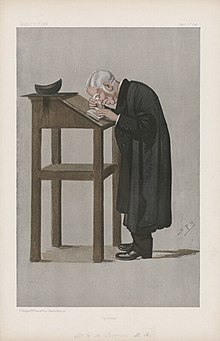William Archibald Spooner

William Archibald Spooner (born July 22, 1844 in London , † August 29, 1930 in Oxford ) was an English clergyman and philosopher. Spoonerism goes back to him , an expression for twisting words with mostly comical results.
Life
William A. Spooner was born in Grosvenor Place in London in 1844. He attended the Oswestry School in Central England, studied at New College , Oxford, and was ordained a priest by the Church of England in 1875 .
He made a career at New College, first as a lecturer (1886), finally as Warden (1903-1924), so head of the college. He taught ancient history, theology and philosophy (focus: the ethics of Aristotle). Overall, he was associated with the university for over 60 years. His few publications were far behind his teaching and administrative activities: The Histories of Tacitus (1891), Bishop Butler, His Life and Writings (1901) and Memoir of William of Wykeham (1909) are the only surviving writings.
Slips of the tongue as fashion
Professor Spooner was considered strict, very religious, and popular. The students found the little man with the big, pale red head (Spooner was possibly albino ) bizarre and weird, called him the Spoo , amused themselves with his strange twisted words and his incisive puns, and turned it into a mental exercise. In the academic circles of Oxford the concept of Spoonerism was already familiar by 1885; by the turn of the century it spread across England and was first mentioned in the Times in 1927 : students should be used as homework etc. a. invent a spoonerism.
It is not known exactly which Spoonerisms actually go back to William A. Spooner personally and how many are based on involuntary comedy. Spooner was considered an intellectual whose thoughts often preceded words. Absence of thought was also one of his characteristics. For example, he introduced his colleague “Dr. Child's friend "as" Dr. Friend's child ”, a widow pitied, saying that her husband had been“ eaten by missionaries ”and said in a sermon:“ The Lord is a shoving leopard ”(instead of:“ The Lord is a loving shepherd. ”). In its 1930 obituary for Spooner, the New York Times stated that the only involuntary lapse that had been handed down as a factual record was the interchange of two sounds in his worship service in 1879: he spoke from the pulpit to his congregation of "Kinquering Kongs Their Titles Take" instead of "Conquering Kings ...", and repeated this text once until an amused murmur went through the ranks. He later issued the text "It is easier for a camel to pass through the knee of an idol" (instead of "... eye of a needle") to his community. Further, Spooner himself ascribed twists and turns were "three cheers for our queer old dean" (instead of "... dear old queen") on the occasion of Queen Victoria's throne anniversary and during a visit of the navy in Portsmouth "to see the cattleships and bruisers" (instead of "Battleships and cruisers").
William A. Spooner was not always happy with his reputation. Once he is said to have turned down students who asked him to tell them something, saying that they didn't want to know anything, just to hear a twist of the word from him to make fun of him. His student Robert Seton said at Spooner's golden wedding party in 1928 that the hype had practically developed by itself without the professor. He and his friend Arthur Sharp have published a book called Spoonerisms , which Spooner said he liked even if none of the twists and turns were on his account.
Spooner had five children. He died on August 29, 1930 and is buried in Grasmere .
literature
- Michael Erard: Um. . .: Slips, Stumbles, and Verbal Blunders, and What They Mean , Anchor 2008, ISBN 978-1-4000-9543-8
- Don Hauptman: Cruel and Unusual Puns (The Intrepid Linguist Library) , Laurel (Holt, England) 1991, ISBN 978-0-440-20850-1
Individual evidence
- ↑ The date of birth is consensus of most sources, but the New York Times writes in an obituary on September 1, 1930 that Spooner was born in North Staffordshire , England .
- ↑ Spoonerisms are based on linguistic peculiarities and can usually not be translated, but this one can. Spooner is supposed to show colleagues instead of “Dr. Kinds Freund "as" Dr. Freunds Kind “.
- ↑ German: "The Lord is a pushing leopard" instead of "The Lord is a loving shepherd". David Weeks / Jamie James: Eccentrics: About the Pleasure of Being Different . Hamburg 1998, p. 66, ISBN 978-3-499-60549-9
- ↑ Who was Dr. Spooner of 'spoonerism' fame? , straightdope.com , 2002
- ^ New York Times , September 1, 1930
| personal data | |
|---|---|
| SURNAME | Spooner, William Archibald |
| BRIEF DESCRIPTION | English clergyman and philosopher |
| DATE OF BIRTH | July 22, 1844 |
| PLACE OF BIRTH | London |
| DATE OF DEATH | August 29, 1930 |
| Place of death | Oxford |